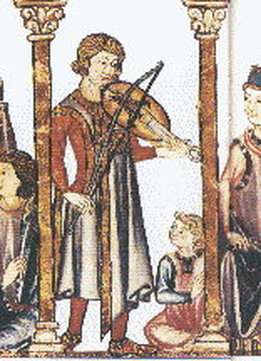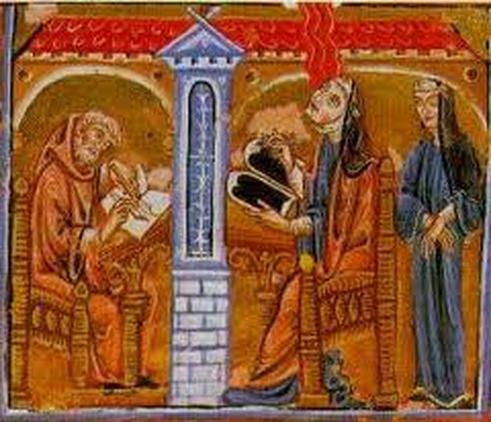Music

Instruments of the time were flutes made of wood, silver or metal. They were blown from the side or end, such as the recorder, gems-horn and pan flute. String instruments include the lute, mandore, gittern and psaltery, dulcimer, zither and lyra, urghun (organ), harp, and salandj (bagpipe), the hurdy gurdy (mechanical violin), jaw harp, fiddle and sackbut (trombone).
Early music was often sacred all though some were secular.
In Flander Fields
In Flander fields the poppies blow
Between the crosses, row on row,
That mark our place, and in the sky,
The larks, still bravely singing, fly,
Scarce heard amid the guns below.
We are the dead; short days ago
We lived, felt dawn, saw sunset glow,
Loved and were loved, and now we lie
In Flander fields.
Take up our quarrel with the foe!
To you from failing hands we throw
The torch; be yours to hold it high!
If ye break faith with us who die
We shall not sleep, though poppies grow
In Flanders fields.
Early music was often sacred all though some were secular.
- There was a tradition of Chant which began with a plain song (Gregorian chant), as time evolved
- parallel voices started an Organum,
- which moved into the liturgical drama (christian stories);
- from that to the Goliards (poet musicians, usually in Latin),
- then to the Parisian School Ars Antiqua which had rhythmic modes
- and then to the later Troubadours who sang secular songs. They were skilled musician, poets and instrumentalists who entertained the crowds.
- with such songs as "In Flanders Field" sung in rounds or in a Rondeau . The round format used was AABBA
In Flander Fields
In Flander fields the poppies blow
Between the crosses, row on row,
That mark our place, and in the sky,
The larks, still bravely singing, fly,
Scarce heard amid the guns below.
We are the dead; short days ago
We lived, felt dawn, saw sunset glow,
Loved and were loved, and now we lie
In Flander fields.
Take up our quarrel with the foe!
To you from failing hands we throw
The torch; be yours to hold it high!
If ye break faith with us who die
We shall not sleep, though poppies grow
In Flanders fields.
Medieval Composers

- Gilles Binchois (employed by Earl of Suffolk)
- Guido de Azrexxo (monk & choirmaster)
- Moniot d'Arras (Northern France Abbey, monk)
- Guillaume de Machant (Secretary for John of Luxembourg)
- John Dustable (composer, astronomer and mathematician)
- Perotinus Magister (little known)
- Leonel Power (English)
- Hildegard von Bingen (earliest drama score "the Ritual of Virtue")